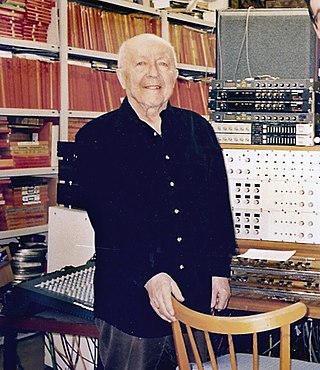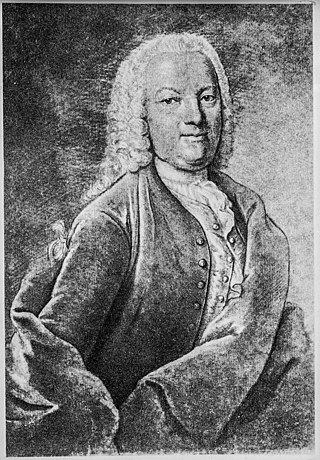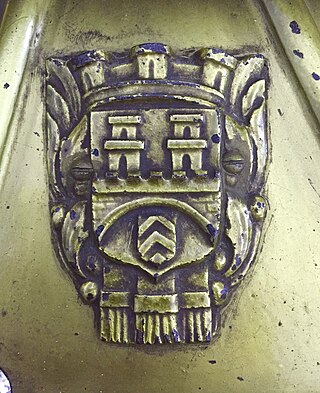Related Research Articles

Curt Sachs was a German musicologist. He was one of the founders of modern organology. Among his contributions was the Hornbostel–Sachs system, which he created with Erich von Hornbostel.

Johann Sebastian Bach composed the church cantata Mein Herze schwimmt im BlutBWV 199 in Weimar between 1711 and 1714, and performed it on the eleventh Sunday after Trinity, 12 August 1714. It is a solo cantata for soprano.
The year 1728 in music involved some significant events.

Gottfried Heinrich Stölzel was a prolific German composer of the Baroque era. Stölzel was an accomplished German stylist who wrote a good many of the poetic texts for his vocal works.

Oskar Sala was a German composer and a pioneer of electronic music. He played an instrument called the Trautonium, an early form of electronic synthesizer.

Johann Georg Pisendel was a German Baroque violinist and composer who, for many years, led the Court Orchestra in Dresden as concertmaster, then the finest instrumental ensemble in Europe. He was the leading violinist of his time, and composers such as Tomaso Albinoni, Georg Philipp Telemann and Antonio Vivaldi all dedicated violin compositions to him.

The mandora or gallichon is a type of 18th- and early 19th-century lute, with six to nine courses of strings. The terms were interchangeable, with mandora more commonly used from the mid-18th century onwards.
Christoph Förster was a German composer of the baroque period.

The Berlin Musical Instrument Museum is located at the Kulturforum on Tiergartenstraße in Berlin, Germany. The museum holds over 3,500 musical instruments from the 16th century onward and is one of the largest and most representative musical instrument collections in Germany. Objects include a portable harpsichord once owned by Prussia's Queen Sophie Charlotte, flutes from the collection of Frederick the Great, and Benjamin Franklin's glass harmonica.

Johann Sebastian Bach composed the church cantata Bereitet die Wege, bereitet die Bahn, BWV 132, in Weimar in 1715 for the fourth Sunday of Advent and led the first performance on 22 December 1715.

The Bach House in Eisenach, Thuringia, Germany, is a museum dedicated to the composer Johann Sebastian Bach who was born in the city. On its 600 m2 it displays around 250 original exhibits, among them a Bach music autograph. The core of the building complex is a half-timbered house, ca. 550 years old, which was mistakenly identified as Bach's birth house in the middle of the 19th century. In 1905, the Leipzig-based Neue Bachgesellschaft acquired the building. In 1907, it was opened as the first Bach museum.

Jesus Christus ist um unsrer Missetat willen verwundet is a St Mark Passion which originated in the early 18th century and is most often attributed to Reinhard Keiser. It may also have been composed by his father Gottfried or by Friedrich Nicolaus Bruhns. Johann Sebastian Bach produced three performance versions of the Passion, the last of which is a pasticcio with arias from George Frideric Handel's Brockes Passion. There are two other extant 18th-century versions of the Passion, both of them independent of Bach's versions. The Passion was performed in at least three cities in the first half of the 18th century: in Hamburg in 1707 and 1711, in Weimar around 1712, and in Leipzig in 1726 and around 1747.

Th. Mann & Co. was a German piano factory, existing in Bielefeld, Prussian Province of Westphalia, from 1836 until 1942, as well as instrument shop for pianos and harmoniums with temporary branch offices in Gütersloh, Herford, Detmold, Rinteln and Paderborn.
Conny Restle is a German musicologist, Museum director and lecturer at the Berlin University of the Arts.
Hans-Heinz Dräger, complete name Hans-Heinz Gerhard Kurt Dräger, was a German-American musicologist. He died in November 1968 at age 58.
Winfried Schrammek was a German musicologist and organist.
Aloys Obrist, also Alois Obrist was a German musicologist, Kapellmeister and conductor.
Franz Xaver Krückl, occasionally also Franz Krückel or Franz Krükl, was an Austrian operatic baritone, stage actor, composer and music educator of Moravian origin.
Jesper Bøje Christensen is a Danish harpsichordist and music researcher, especially in the field of basso continuo.
Gustav Fock was a German music historian, editor early music and organologist. He is considered the most important Schnitger researcher of his time.
References
- ↑ Johann David Heinichen's : Comprehensive Instruction on Basso Continuo with Historical Biographies. on WorldCat
- ↑ Berlin: Elektropolis des Instrumentenbaus? on WorldCat
- ↑ Das Trautonium: Prozesse des Technologietransfers im Musikinstrumentenbau on WorldCat
- ↑ Good vibrations. Eine Geschichte der elektronischen Musikinstrumente on WorldCat